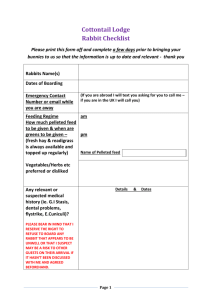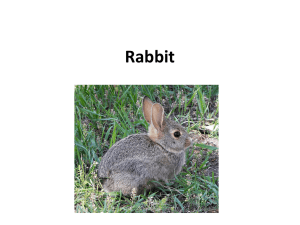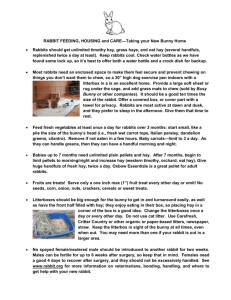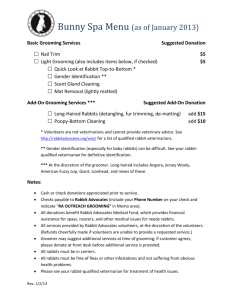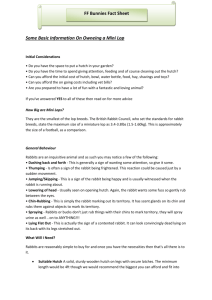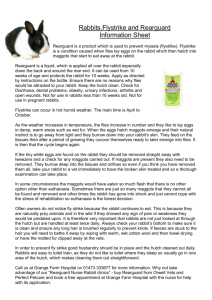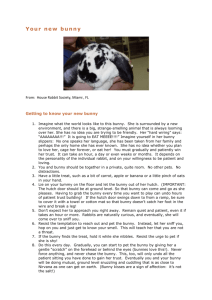Rabbit Care
advertisement
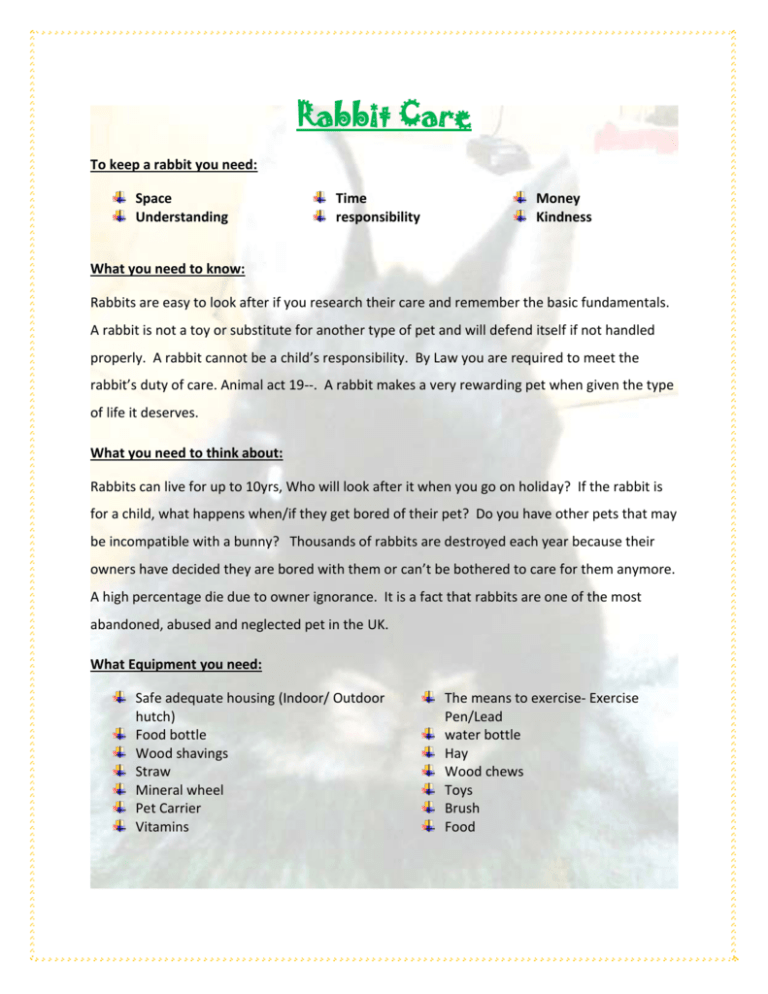
Rabbit Care To keep a rabbit you need: Space Understanding Time responsibility Money Kindness What you need to know: Rabbits are easy to look after if you research their care and remember the basic fundamentals. A rabbit is not a toy or substitute for another type of pet and will defend itself if not handled properly. A rabbit cannot be a child’s responsibility. By Law you are required to meet the rabbit’s duty of care. Animal act 19--. A rabbit makes a very rewarding pet when given the type of life it deserves. What you need to think about: Rabbits can live for up to 10yrs, Who will look after it when you go on holiday? If the rabbit is for a child, what happens when/if they get bored of their pet? Do you have other pets that may be incompatible with a bunny? Thousands of rabbits are destroyed each year because their owners have decided they are bored with them or can’t be bothered to care for them anymore. A high percentage die due to owner ignorance. It is a fact that rabbits are one of the most abandoned, abused and neglected pet in the UK. What Equipment you need: Safe adequate housing (Indoor/ Outdoor hutch) Food bottle Wood shavings Straw Mineral wheel Pet Carrier Vitamins The means to exercise- Exercise Pen/Lead water bottle Hay Wood chews Toys Brush Food Housing Rabbits can be housed in many ways; the most common is an indoor hutch or outdoor hutch and run. It is very important that each rabbit has enough space to fully lie down, stand up on its back legs and do at least 3 hops across the cage and double if their is more than one. Whatever set up you choose it must be draft proof, weather proof, predator proof (cats, dogs, foxes), escape proof and safe, no sharp edges. If you decide to keep your bunny indoors remember to bunny proof your home, making sure anything dangerous is out of bunnies reach, Wires, poisonous plants etc. Any outside enclosure/exercise pen needs to be maintained so your bunny cannot bury out and be covered/lidded so birds and other predators can’t get in. Make sure the housing is situated so the rabbit doesn’t get too hot or cold, add wood shavings to the floor to insulate and soak up urine and add straw to bed area for comfort and warmth. Food Rabbits need a proper diet, consisting of pellets, fresh greens, hay and herbs. There are 2 types of commercial food, mixed and all in one pellet. The disadvantage of mixed pellet is the rabbit picks and chooses the bits it likes then wastes the rest, which results in an unbalanced diet. The disadvantage with complete pellets is the rabbit may get bored but it receives a balanced diet that combined with good husbandry will keep your rabbit healthy. Do not feed lettuce; it can cause bad diarrhoea, which can damage the digestive system, sometimes resulting in fatality. I wouldn’t recommend feeding your rabbit greens until it is about 6mths old. Start with tiny bits and increase over time, if your rabbits dropping go really soft and sticky reduce quantity or frequency of greens until it evens back out. If your rabbit does very small hard droppings it is most likely constipated and adding a little extra greens can help the droppings return to normal. Wash all greens before feeding and check it is suitable for a rabbit diet. Some examples of suitable greens and herbs are: Cabbage, Carrot, Broccoli, Sweet corn, Cauliflower, Sprouts, Basil, parsley and dandelion. As Fibre is a very important part of a balanced diet a rabbit needs to eat plenty of fresh hay everyday. Fresh water is vital to survival and is an easy way to administer added vitamins. Adding a mineral wheel to your rabbit’s environment is beneficial to health and can provide some mental stimulation. Keep food and water utensils clean to prevent bacterial build up and remove any uneaten greens regularly. Rabbits Need SECS Space: - to move, exercise and display normal behaviour. . Exercise: - Exercise is essential for health both physical and mental. Company: - Rabbits are social creatures and need some form of company whether it is a human or another rabbit. Stimulation: - Rabbits need mental stimulation to keep them happy, toys, chews, etc. A rabbit deprived of the above can become obese, destructive due to boredom, aggressive due to lack of socialisation and can develop skeletal problems. Disease prevention – The best way to prevent disease in your rabbit is to: Keep a good hutch cleaning regime. Keep food and water utensils clean. Quarantine any new rabbits for at least 2 months. Keep a balanced, healthy diet. Worm your rabbit against intestinal parasites and e.cuniculi every six months. Vaccinate against myximatosis and viral haemorrhage disease. Use a regular flea treatment. Provide plenty of chewing material to prevent dental problems. Breeding You should only breed your bunny if: It is healthy Is an excellent example of its breed (show standard) You have the money and space to look after the litter. The money for all the vet bills. You have homes in mind for them. You have the facilities to care for the entire litter if for any reason you can’t rehome them. You have at least a basic understanding of the process and care plus any health problems the rabbits might encounter. You should never breed rabbits if: They are poor examples. Are brother and sister. Just to make money. (you spend more than you gain) Because the babies are cute. You don’t have the necessary experience. It is a good idea to neuter your bunny as it can prevent some cancers, stops them from making unwanted babies and reduces aggression from breeding behaviours. As soon as you get your bunny you should book a vets appointment for a week later to have its first check up and to gain advice on when would be the best time to vaccinate, worm and neuter your pet.
